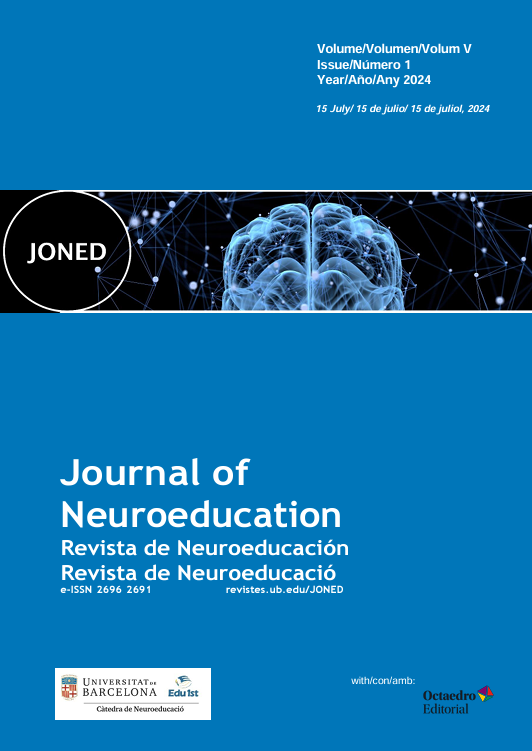Caracterización de la memoria de trabajo, el estilo cognitivo y el rendimiento académico en matemáticas de estudiantes de 9-14 años, según su género y edad
DOI:
https://doi.org/10.1344/joned.v5i1.43035Keywords:
working memory, cognitive style, field dependence-independence, academic performance, mathematicsAbstract
The purpose of this study was to characterize working memory, field dependence-independence cognitive style, and academic performance in mathematics of 87 students aged between 9 and 14 years, according to their gender and age. The study was carried out with an empirical-analytical approach, non-experimental cross-sectional design, descriptive level. Regarding gender, the results revealed that men and women presented a high academic performance in mathematics. In working memory, both genders were within the normal range for the phonological loop and the visuospatial agenda; however, slightly higher scores were observed in men. Regarding the field dependence-independence cognitive style, both genders were located at an intermediate field level. Regarding age, it was found that in the visual-spatial agenda, younger men obtained lower average scores, while in the phonological loop, 14-year-old boys obtained higher scores. Regarding cognitive style, an increase in scores was observed as age increased. Finally, regarding academic performance, it was found that children from 9 to 11 years old obtained a high academic performance on average, while the older ones obtained a basic performance. These findings suggest that both working memory and cognitive style may play a crucial role in academic performance in mathematics and could be determining factors in the differences observed in this area. Study limitations and suggestions for education are presented.
Downloads
Downloads
Published
Issue
Section
License
Copyright (c) 2024 Ana María Flórez Durango, Valentina Herrera Escudero, Carlos Andrés Toro, Paula Andrea Montoya Zuluaga

This work is licensed under a Creative Commons Attribution-NonCommercial 4.0 International License.
The authors who publish in this journal agree to the following terms:
a. Authors retain copyright and grant the journal the right of first publication
b. Texts will be published under a Creative Commons Attribution Non Commercial License that allows others to share the work, provided they include an acknowledgement of the work’s authorship, its initial publication in this journal and the terms of the license, and not for commercial use.



